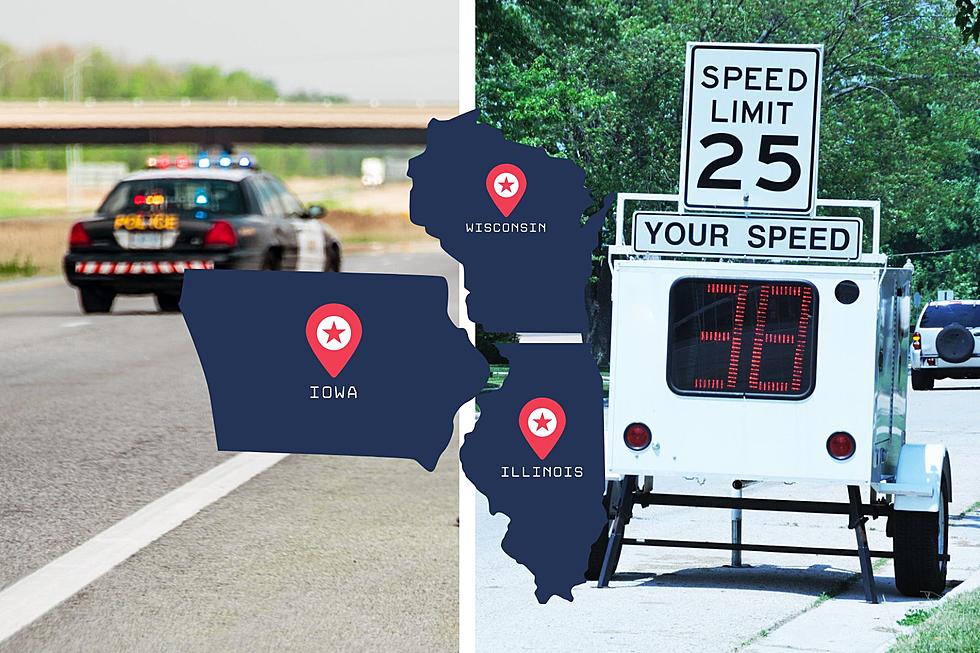
Can You Legally Go 10 MPH Over the Speed Limit in IA, IL, and WI?
We've all been in this situation: we know the speed limit is 65 mph, but we tempt fate and do 70 mph. Maybe we're a little gutsier and try 75 mph. We know we probably shouldn't, but we do anyways, in hopes of getting to our destination sooner and... after all, a few miles over the posted limit is acceptable, right?
I come from Illinois, where there's an adage about monitoring your speed on highways. The phrase I always heard growing up is "nine, you're fine, 10, you're mine," in reference to going nine miles-per-hour won't get you pulled over by law enforcement, whereas 10mph or more, and you're likely to be lit up if you pass a cop.
I decided to do a deep dive into the Tri-States speeding laws to see if going 10mph over the posted limit is acceptable. I felt it better to test this theory with online sources as opposed to practicing it in my vehicle:
Speeding Laws in Iowa:
According to NOLO, a website that is helpful in breaking down various rules of the road, in Iowa, the cost of your speeding ticket will depend on how fast you were going. Here's how it breaks down:
- $20 for exceeding the speed limit by not more than five miles per hour
- $40 for exceeding the speed limit by more than five but not more than ten miles per hour
- $80 for exceeding the speed limit by more than ten but not more than 15 miles per hour
- $90 for exceeding the speed limit by more than 15 but not more than 20 miles per hour, and
- $100 plus $5 for each mile per hour in excess of 20 miles per hour over the limit.
Something I didn't realize is the punitive nature of being caught speeding in school zones. Sure, we all know school zones carry different weight, but if you're caught going 10 mph over a school zone's speed limit, you could spend 30 days in jail and pay anywhere from $65 - $625 in fines.
Speeding Laws in Illinois:
Take it from someone who lived in Illinois for 25 years. Violations are more punitive in the Land of Lincoln, especially when compared to Iowa. The same goes for speeding violations. The law firm Andrew Nickel breaks it down:
- If you are driving anywhere from 1 to 20 mph over the limit, expect a $120 fine. Speeding 21-30 miles per hour over the limit will likely lead to a fine of around $140.
- Driving 26 to 34 miles per hour over the limit is considered a Class B misdemeanor and can bring approximately 6 months in prison and a maximum of $1,500 in fines.
- Speeding 35 miles per hour or more over the limit is considered a Class A misdemeanor. This consequences for this increase from the previous set of punishments. They include up to one year in prison and a maximum of $2,500 in fines.
Like Iowa, Illinois has a heavy punishment for speeding in specific zones. In a construction/work zone in particular, speeding gets you a minimum fine of $375 and a mandatory appearance in court.
Speeding Laws in Wisconsin:
Wisconsin does something drastically different from Iowa and Illinois. Per Ticket Void, the state has devised a point system for moving violations. If you accumulate up to 12 points, your license will be suspended. Here's how you get those demerit points:
- Speeding anywhere from 1-10 miles-per-hour is 3 points
- Speeding anywhere from 11-19 miles-per-hour is 4 points
- Speeding 20 miles-per-hour or more is 6 points
If you thought you'd get off the hook with simple point accrual, think again. Your first speeding offense in Wisconsin could still result in you paying anywhere from $30-$300. Going over 25 mph is what the state considers "reckless driving," which could land you a fine of up to $200 and a jail-stint anywhere from five to 90 days as well as your license suspended for a year.
Think before you speed, as your actions on the road put other drivers, passengers, and pedestrians at risk.
A "Barbiecore" Mansion in Hudson, WI is For Sale
More From Y105







